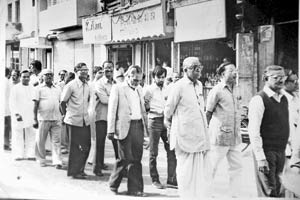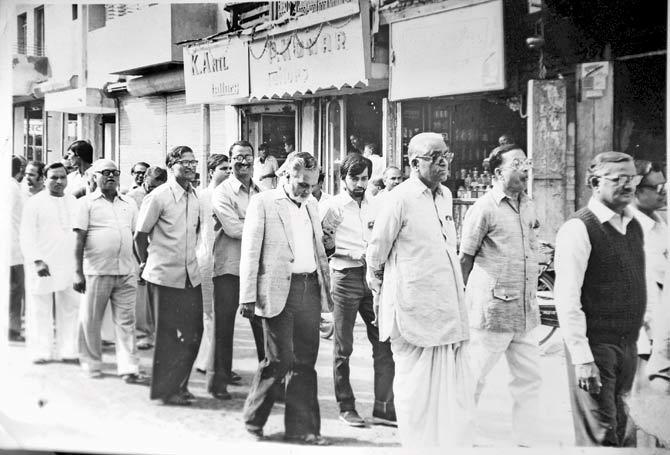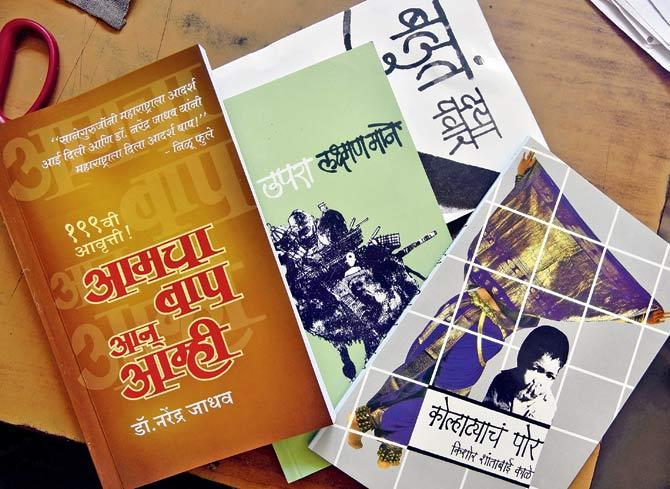A publishing house that started a reading movement back in the '70s, is set for a new innings to revive the language of its people


The Granthali Vishwastha Sanstha has been operating out of a Marathi municipal school in Matunga West for the last six years. It has moved six offices, since it was launched in 1974. Pics/Pradeep Dhivar
It's a busy morning, when we visit Granthali Vishwastha Sanstha, a Marathi publishing house located on the ground floor of Woolen Mill Municipal School, Matunga West. A volunteer is busy labelling books in the corridor. Inside the 350 sqft space, there's a smell of freshly printed books. Stacked with tomes - some almost reaching the ceiling - there's little room to navigate. But, that's how Granthali has operated over the decades, with offices being moved over six times.

Playwright Vijay Tendulkar (fourth, from right) was an ardent supporter of the movement. This picture was taken in Aurangabad at a Granthali event in 1988
The publishing house was launched in 1974 by journalists Ashok Jain, Dinkar Gangal, Arun Sadhu and Kumar Ketkar, who initially intended to create an informal organisation to spread the culture of reading among Marathi speakers. Over the years, it has seen several members come and go and even survived a slump. But now, the publishing house is ready for its next big innings.

Granthali has published several iconic books, including Dalit memoir Baluta
More than a university
Last week, Chief Minister Devendra Fadnavis provided a land grant to Granthali to set up a Marathi University in Bandra's Bandstand area. They have also been offered a sprawling 2,000 sqft office, a few metres from the current location. The idea is to enable native Marathi speakers forge a new connection with their literature. But, whether the initiative will help bring about change, still remains to be seen.
Ironically, the Granthali office is located inside a Marathi medium municipal school that has been struggling with new enrolments due to lack of students. On the day of our visit, we see only a handful playing in the quadrangle. Given the situation, trustee and treasurer Dhananjay Gangal feels the move couldn't have come at a better time. "I wouldn't, however, call it a university, as we won't have courses, professors or a vice-chancellor. What we have in mind is a space where we will hold workshops and festivals on the Marathi language. We also have plans to set up a digital library," he says.
Language of the masses
Until now, as many as 130 publications have been produced by them, with many new authors hailing from smaller towns. "The emerging breed of writers are mostly from II and III-tier towns," he says.
This is in stark contrast to the situation that the founders confronted back in the 1970s, where most literature was being produced by people in the urban areas. "At the time, literature was elitist. So, the founders initiated steps to ensure that the reading habit went beyond the privileged urban middle class," he says.
It was also a period of great turbulence - the Indo-Pakistani War of 1971, inflation, Dalit Panther and women's liberation movement. "The literature of the period reflected the mood of the people and yet, it did not reach vast sections of the readers," he adds.
The reason behind this was lack of accessibility and availability of books rather than interest, feels Sudesh Hinglaspurkar, executive trustee. At the Marathi Sahitya Sammelan at Ichalkaranji in 1973, the founder-members met at a Mumbai restaurant and decided to form an ad hoc organisation called Granthali.
Each one wrote postcards, introducing Granthali and requesting the addressees to spread the message. Playwright Vijay Tendulkar was one of its core members. "Each one decided to contribute by shelling out R25 from their pockets. With this, we decided to become publishers," recalls Gangal. The idea was to offer readers four books for Rs 25. "This received a thunderous response," recalls Hinglaspurkar.
Making it accessible
The reading public that would normally have had to pay at least Rs 60 or more for four books, was buoyed by the sheer volume they could access with the sum. Hinglaspurkar recalls how buses were arranged, filled with books that could be distributed among masses in the hinterland. With this, new authors were discovered and new subjects were written about. "The literature of each period reflected the mood of the time. While the '70s saw writings that were more politically-driven, it mellowed later," says Gangal.
Daya Pawar, a little known Dalit writer, was one such gem. His book Baluta, one of the first Dalit autobiographies that Granthali published, shook Marathi readers out of their reverie. It captured the life of deprivation that the caste system forced on members of the community. "It was considered a benchmark for Dalit memoirs. He used language not only to revolt, but for deep introspection."
One book that continues to fascinate Gangal is Arun Sadhu's Sinhasan (Throne), which captured the imagination of his readers for its outstanding plot. The novel was based on politics and corruption. It highlighted the deep nexus between politicians and trade union leaders and industries. The movie was made into a film by Jabar Patel.
Over the years, the group has received its share of brickbats with some claiming said that Granthali had drifted from the objective of providing books at affordable prices, and others pointing to the drop in editorial quality. "Yes, there was criticism. But, that's what it means to be in a democracy. You agree to disagree," says Gangal.
For him, one of the biggest achievements of the organisation was giving a voice to people, who would have otherwise not written. For instance, Sudhir and Nandini Thatte, two BARC employees, have been writing a children's book titled Nobel Nagaratil Naval Sapne, where they explain the life and achievements of Nobel prize winners.
Last month, they also published a thriller Lochgriffin on the lines of Jeffrey Archer by Vasant Vasant Limaye, a CEO of High Places Private Limited, an outbound management training in India. The task cut out for them now is to attract the younger audience. "It's a challenge, I admit. But, it's not impossible to achieve," he adds.
Catch up on all the latest Mumbai news, crime news, current affairs, and also a complete guide on Mumbai from food to things to do and events across the city here. Also download the new mid-day Android and iOS apps to get latest updates
 Subscribe today by clicking the link and stay updated with the latest news!" Click here!
Subscribe today by clicking the link and stay updated with the latest news!" Click here!







